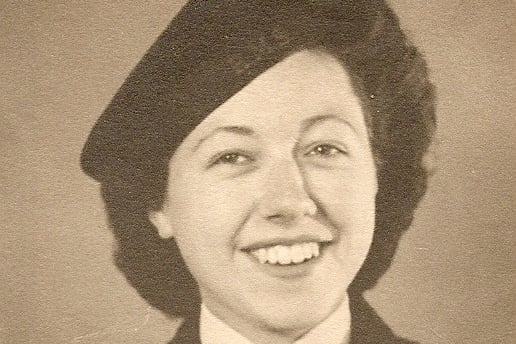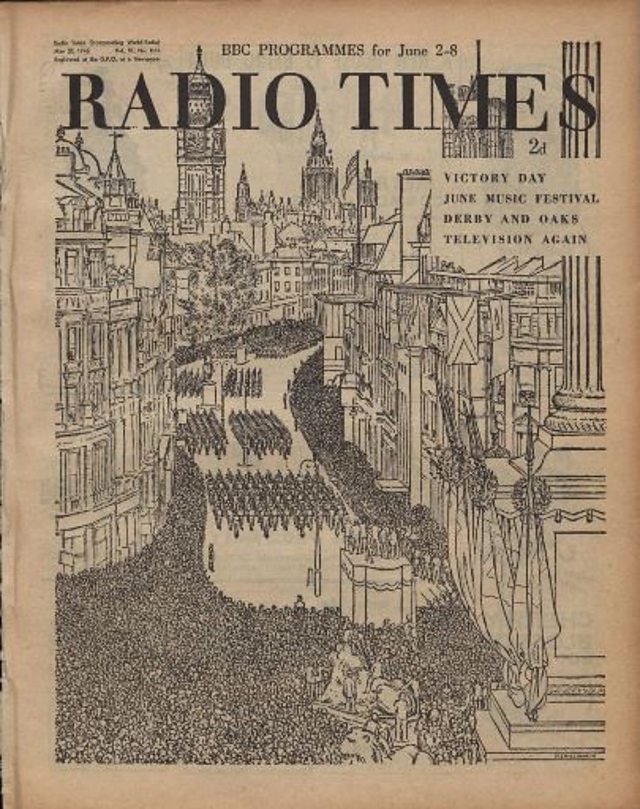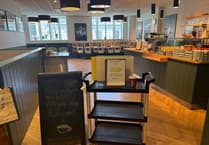In the summer of 1944 Kathleen Oates - a Wren assigned to the Women's Royal Naval Service during the Second World War - was transferred to the Isle of Man. During her time on the island, she wrote dozens of letters to home which provide a unique commentary on the operations at ronaldsway">Ronaldsway and what life was like on the Isle of Man 80 years ago. Her daughter, CHRISTINE SMITH, pores through her mother’s letters as part of a series of columns based on Kathleen Oates’s writing...
Wren Kathleen Oates’ leave was due to fall on VE Day, so she would be at home in Leicester for the May 8 celebrations. Eighty years ago this week, her thoughts were very much about her upcoming journey and seeing the family.
Thus, Kathleen didn’t refer to Hitler’s death on April 30, even though the news had reached the British public by the time she wrote. Instead, she spoke of how at the weekend (of April 28-29), she had focused on altering the hem of her ‘everyday’ skirt, which was wearing into holes at the bottom, so needed to be shortened. This was a sign of the shortage of clothing rather than lack of available funds to buy a new skirt.
Continuing with the theme of quotidian doings, Kathleen had written of having her hair done. ‘This morning I’ve had my hair set on camp. We are charged 6d for a shampoo and set and she does it really well.’ The prices on the Base got the attention of Mum Elsie, who replied, ‘6d for a shampoo and set – you lucky people! It’s 4/6d here, you know’. Kathleen had previously complained about the cost of shoe repairs, and Elsie also felt that Kathleen had better prices on the Isle of Man: Elsie had paid either 6/ or 6/6d to get some shoes repaired so Kathleen’s 5/ was ‘well in’.
Reflecting how personnel at Ronaldsway and the Isle of Man were still focussed on the War in the Pacific, she mentioned that she had heard that Geoffrey, the office boy where she had worked in Leicester before joining the Services, was training in Douglas, and that she would have to look him up one day.
The question of Kathleen’s social status had finally been cleared up with her friends in Liverpool. The Muirs were kindly people who had offered her a home from home when she was posted there, prior to the Isle of Man. By the standards of the times, they were perceived to be higher up the social scale as Mrs Muir’s brother was the Captain of a destroyer, while Kathleen’s father sold fish and chips. Kathleen had finally plucked up her courage and revealed her social status to the Muirs, and received what was, by 1940s standards, a most kind and understanding reply. ‘You need not feel unhappy for one moment because you did not divulge the proper nature of your parents’ business. To us, there is no difference between the people who sell fish and chips and those who sell butter and sugar. Both are perfectly honest and very necessary. It is always very hard lines on any man to lose a good position [Kathleen’s father Chris lost a more middle class job in the depression of the 1920s] through no fault of his own and we admire your father and also your mother that when adversity came, they were not afraid to work - and fish and chip shops mean hard work. In any case Kathleen dear, there has never been any need for you to be sensitive so far as we are concerned. We have always been fond of you for yourself alone and enjoyed having you here with us. Get rid of the idea once and for all that there is anything to blush about as far as we are concerned. Nevertheless, we are glad you have told us if it makes you any happier. Both my husband and I look forward very much to meeting your parents when the peace is won.’

This reply had been sent to Kathleen’s family, who approved. Chris Oates, in his next letter to Kathleen, wrote that ‘I like her sound common sense and her attitude to people who run certain kinds of businesses, but it isn’t everyone who would be so understanding – there are plenty of snobs about.’
Back to the subject of her leave, Kathleen had worked out the ferry and train times and would travel in daytime via Preston and Nuneaton to Leicester. ‘It will be nice travelling all the way home in the light, instead of in dimly lit carriages. Wartime trains were subject to blackout regulations, just as were all buildings.
However, another note was hurriedly sent the following day, May 3. The timing of Kathleen’s leave was now in the air as her fellow Plotter, Cynthia, had been granted an extension of her leave due to gastroenteritis. Without her replacement, Kathleen was needed at Ronaldsway: no-one else did the work that she and Cynthia did. Kathleen would have to send a telegram on May 4 if she were not coming as planned.
Only in this second letter were the War’s events touched on. ‘What do you think of the news? Somehow, I don’t feel at all excited – think it’s my mood at the moment. Looking at the situation from a personal point of view – ‘peace’ will be more of a worry to me than war! I’ve read up several A.F.O.s on the Government Teaching Scheme - & I’ve also thought of volunteering for the Pacific War – but don’t worry, I shan’t do anything yet… Maybe ten days at home will convince me that that’s where I really want to be.’
Happily, Kathleen did make it back to Leicester, where she would have felt at odds with the crowds celebrating VE Day, when the Ronaldsway pilots continued to risk their lives not just in the Pacific War, but in training for it. Her next letter home from the Isle of Man would be on May 17.


.JPG?width=209&height=140&crop=209:145,smart&quality=75)


Comments
This article has no comments yet. Be the first to leave a comment.